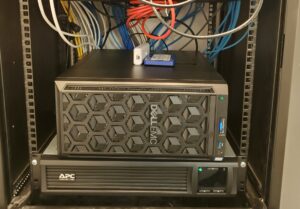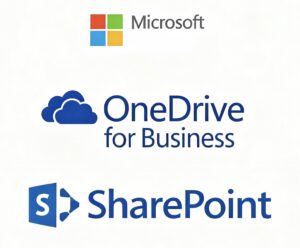
As your business grows, so do your data sharing needs. A handful of employees passing files quickly turns into teams needing secure, reliable ways to access and share information, sometimes across multiple locations.
At SkyViewTek, we help small businesses set up the right infrastructure so collaboration stays efficient, safe, and seamless. Depending on your goals, we typically recommend one of three approaches:
1. On-Premise Server (Traditional Office Server)

How it works:
A physical server is installed right inside your office, almost always in a secured “data closet” or dedicated IT room. This closet holds a server rack with network equipment, patch panels, and neatly organized cables all tucked away behind a locked door for security. Employees connect on-site or remotely through a secure VPN.
Best for:
Businesses who prefer to keep everything in-house, with most staff working at a central office.
Pros:
- Complete control over your data and devices
- No internet required for in-office access
Cons:
- Higher upfront cost for equipment and installation
- Ongoing maintenance needed
- Less flexibility for remote and hybrid work
2. Virtual Server (Hosted Offsite in a Data Center)

How it works:
Instead of keeping hardware in your office, your server operates virtually in a professional, secure data center facility. These facilities house rows of modern server racks with top-tier climate control, security, and reliability. Employees access the virtual server via the internet, allowing business continuity even if your office has technical issues.
Best for:
Businesses that want the convenience and reliability of a server—with no hardware to manage on-site.
Pros:
- Scalable and flexible
- Lower risk of downtime from office-specific outages
- Accessible from anywhere with an internet connection
Cons:
- Ongoing monthly operating costs
- Potential for slightly more complex setup and management
3. Microsoft OneDrive for Business and SharePoint (Cloud Collaboration)

How it works:
SkyViewTek recommends OneDrive for Business and SharePoint—two connected Microsoft 365 cloud solutions for secure file sharing and collaboration.
- OneDrive for Business is your personal business storage, tied to your work email and Microsoft 365 business account. It’s meant for professional files and seamless company teamwork.
- Personal OneDrive (displayed as a white cloud icon) is entirely separate and uses a personal Microsoft account (like Hotmail or Outlook.com)—it is not intended for business documents or collaboration, and your work files should always be kept on OneDrive for Business.
When you log in, select “Work or school account” to access your OneDrive for Business. Files saved here are securely backed up and restore-able, and shared with your organization only as needed.
SharePoint:
SharePoint is your company’s shared file space in Microsoft 365.
- Think of SharePoint as a virtual “server drive,” where company folders, projects, and collaborative files are stored and managed with customizable team or department access.
Integration:
OneDrive for Business and SharePoint work together in Microsoft 365—your personal files are powered by your own SharePoint site, and team files by shared company SharePoint folders.
Which Option is Right for You?
Each setup offers different advantages when it comes to cost, security, flexibility, and ease of use. At SkyViewTek, we’ll work with you to design the right fit—balancing productivity with peace of mind as your business expands.
📞 Contact SkyViewTek today for a free consultation on file sharing solutions that keep your teams working smoothly and securely.
We are available Monday through Friday, 8:30am to 5pm EST at 610-590-5008. For urgent work stoppage issues, please call and email, noting “emergency” in your message. For other inquiries, call 610-590-5006.